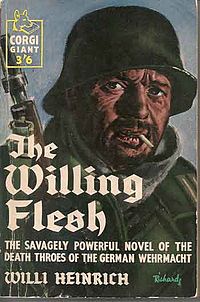- The Willing Flesh
-
The Willing Flesh 
Cover from UK paperbackAuthor(s) Willi Heinrich Country West Germany Language German Genre(s) War novel Publisher Corgi Giant (UK) Publication date 1955 Media type Print (Hardback & Paperback) Pages 412 pages (Hardback edition) &
368 pages (Paperback edition)The Willing Flesh (German: Das Geduldige Fleisch, 1955) (English translation released 1956) is a novel by Willi Heinrich, chronicling the Eastern Front combat experiences of a depleted infantry platoon during the 1943 German retreat from the Taman Peninsula in the Caucasian coast of Russia.
The war film, Cross of Iron (1977), directed by Sam Peckinpah, is based upon this novel. Later editions of The Willing Flesh have been re-titled Cross of Iron to link book and film.
Contents
Historical Basis
The literary and cinematic "Sergeant Steiner" character may be based upon Johann Schwerdfeger (b. 24 November 1914, in Plein bei Wittlich) who soldiered from 1935 to 1937 in Infanterie Regiment 84, and in 1939 was transferred to the Third Company of Infanterie Regiment 186 of the 73rd Infantry Division, at the Polish Campaign's start.
In June 1942, after serving in Jägerersatzbataillon 75, Schwerdfeger joined Jäger Regiment 228 of the 101st Jäger Division, who fought in the Don Bend, at Rostov, and at Maikop, in the Caucasus, and joined the retreat through the Kuban and the Taman Peninsula, the setting of the novel Das Geduldige Fleisch (The Willing Flesh).
On 17 May 1943, Feldwebel Schwerdfeger was awarded the Knight's Cross as a platoon leader in the First Company. In April 1944, in the breakout from Hube's Pocket, he was severely wounded, and was awarded Oak Leaves for his Knight's Cross on 14 May 1944; moreover, Sergeant Schwerdfelger also earned two tank destruction badges.
In two passages of The Willing Flesh (the novel's English edition), Meyer tells Stransky that Steiner saved Lieutenant Colonel Brandt's life; in the original German edition, "Meyer" is named "Schäfer", and "Brandt" is named "Strauss".
From Das Geduldige Fleisch, in German:
- "Steiner hat ihm einmal sein Leben gerettet"; and “Es war bei Studenok am Donez. Strauss führte damals schon das Bataillon. Die zweite Kompanie lag, soviel mir bekannt ist direkt am Donez. Den Russen war es gelungen, bei Nacht über den Fluss zu kommen. Bei den Kämpfen wurde die zweite Kompanie fast völlig aufgerieben. . . ."
From The Willing Flesh (Cross of Iron), in English:
- “Steiner saved his life once . . . . It happened at Studenok on the Donets River. Brandt was already the battalion CO then. The Second Company was situated, as far as I know, right on the riverbank. The Russians had succeeded in crossing the river at night. In the battle, the Second Company was almost completely wiped out. . . ."
During the war, a similar action occurred to the First Battalion of the 228th Jäger Regiment. Two German military history books about that division chronicle how one of the battalion's company's was surprised and pinned down by two Russian regiments and eleven tanks of the 296 Division, who had crossed the Donets River the night of 19-20 May 1942.
Characters
The Platoon
- Feldwebel Rolf Steiner
- Unteroffizier Krüger
- Obergefreiter Karl 'Schnurrbart' Reisenauer
- Private Dorn
- Private Hollerbach
- Private Pasternack
- Private Dietz
- Private Kern
- Private Zoll
- Private Maag
- Private Anselm
High Command
- Captain Stransky
- Lieutenant-Colonel Brandt
- Captain Kiesel
- Lieutenant Meyer
- Lieutenant Gausser
- Lieutenant Triebig
Categories:- 1956 novels
- German novels
- German-language novels
- World War II novels
- Novels set in Russia
- 1950s novel stubs
Wikimedia Foundation. 2010.
